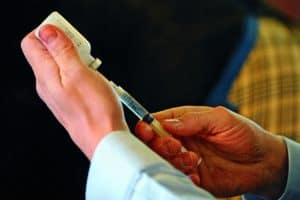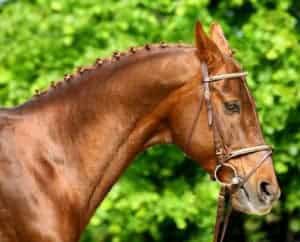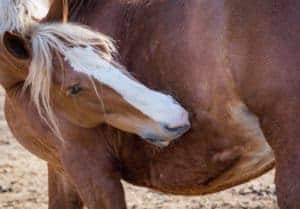
Impact of Short-Term Transportation Stress on Equine Endocrine and Immune Function
New research shows that veterinarians might need to allow several hours between transportation and testing for conditions such as PPID.

New research shows that veterinarians might need to allow several hours between transportation and testing for conditions such as PPID.

New research might lead to a vaccine for this highly contagious disease.

One expert explains the pros and cons of vaccinating your horse against EHV-1.

Learn about the latest research surrounding the neurologic conditions equine neuroaxonal dystrophy (eNAD) and equine degenerative myeloencephalopathy (EDM).

Riders and owners might miss behavioral signs of pain in their horses. The RHpE is a scientifically validated tool for assessing pain in ridden horses.

Since 2008 the University of California, Davis, School of Veterinary Medicine and Merck Animal Health have worked to cultivate a strong biosurveillance program.

Gastric ulcers in horses can be challenging to identify and, in many cases, treat, but proper management practices can help reduce their occurrence.

Proper nutrition is essential to giving your foal a healthy start to life. Learn how to feed a foal that has been orphaned, rejected, or born to a mare with no milk.

Allergy tests can help veterinarians identify possible allergens for inclusion in a horse’s immunotherapy program.

Standing surgery allows for treatment options that might not have been possible previously due to risks associated with general anesthesia.

How can biomarkers be used to help improve performance and reduce injury risk in horses?

The potential benefits of probiotics and how to choose the right product.

Learn how to treat this skin condition in show horses without inadvertently breaking drug rules.

Equine economist Dr. Jill Stowe of the University of Kentucky gives an overview of the short- and long-term effects of COVID-19 on the horse industry.

Insect bite hypersensitivity is a lifelong condition, and affected horses will always need management and/or therapy. But often a patient can be clinical-sign-free with low exposure to inciting antigens.

The desire to feed a starved horse well can have catastrophic consequences, resulting in a refeeding syndrome.
Stay on top of the most recent Horse Health news with
© 2022 Copyright Statement dolor sit amet, consetetur sadipscing User Terms, sed diam nonumy eirmod tempor invidunt ut labore et dolore magna aliquyam erat, sed diam voluptua. At vero eos et accusam et justo duo dolores et ea rebum. Stet clita kasd gubergren, no sea takimata sanctus est Lorem ipsum dolor sit amet.